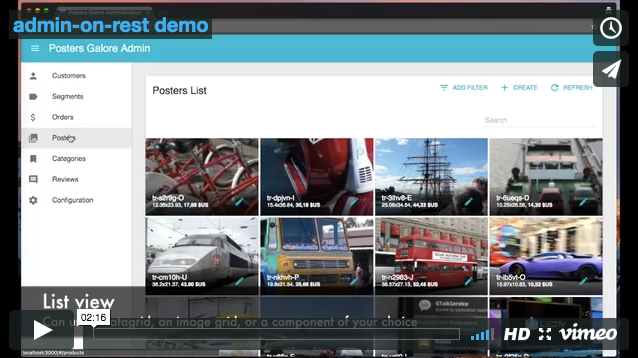A frontend Framework for building admin applications running in the browser on top of REST services, using ES6, React and Material Design. Open sourced and maintained by marmelab.
Demo - Documentation - Releases - Support
- Adapts to any REST backend
- Complete documentation
- Optimistic rendering (renders before the server returns)
- Relationships (many to one, one to many)
- Internationalization (i18n)
- Conditional formatting
- Themeable
- Supports any authentication provider (REST API, OAuth, Basic Auth, ...)
- Full-featured Datagrid (sort, pagination, filters)
- Filter-as-you-type
- Supports any form layout (simple, tabbed, etc.)
- Data Validation
- Custom actions
- Large library of components for various data types: boolean, number, rich text, etc.
- WYSIWYG editor
- Customize dashboard, menu, layout
- Super easy to extend and override (it's just React components)
- Highly customizable interface
- Can connect to multiple backends
- Leverages the best libraries in the React ecosystem (Redux, redux-form, redux-saga, material-ui, recompose)
- Can be included in another React app
- Inspired by the popular ng-admin library (also by marmelab)
Admin-on-rest is available from npm. You can install it (and its required dependencies) using:
npm install --save-dev admin-on-restRead the Tutorial for a 15 minutes introduction. After that, head to the Documentation, or checkout the source code of the demo for an example usage.
// in app.js
import React from 'react';
import { render } from 'react-dom';
import { simpleRestClient, Admin, Resource } from 'admin-on-rest';
import { PostList, PostEdit, PostCreate, PostIcon } from './posts';
render(
<Admin restClient={simpleRestClient('http://localhost:3000')}>
<Resource name="posts" list={PostList} edit={PostEdit} create={PostCreate} icon={PostIcon}/>
</Admin>,
document.getElementById('root')
);The <Resource> component is a configuration component that allows to define sub components for each of the admin view: list, edit, and create. These components use Material UI and custom components from admin-on-rest:
{% raw %}
// in posts.js
import React from 'react';
import { List, Datagrid, Edit, Create, SimpleForm, DateField, TextField, EditButton, DisabledInput, TextInput, LongTextInput, DateInput } from 'admin-on-rest/lib/mui';
export PostIcon from 'material-ui/svg-icons/action/book';
export const PostList = (props) => (
<List {...props}>
<Datagrid>
<TextField source="id" />
<TextField source="title" />
<DateField source="published_at" />
<TextField source="average_note" />
<TextField source="views" />
<EditButton basePath="/posts" />
</Datagrid>
</List>
);
const PostTitle = ({ record }) => {
return <span>Post {record ? `"${record.title}"` : ''}</span>;
};
export const PostEdit = (props) => (
<Edit title={PostTitle} {...props}>
<SimpleForm>
<DisabledInput source="id" />
<TextInput source="title" />
<TextInput source="teaser" options={{ multiLine: true }} />
<LongTextInput source="body" />
<DateInput label="Publication date" source="published_at" />
<TextInput source="average_note" />
<DisabledInput label="Nb views" source="views" />
</SimpleForm>
</Edit>
);
export const PostCreate = (props) => (
<Create title="Create a Post" {...props}>
<SimpleForm>
<TextInput source="title" />
<TextInput source="teaser" options={{ multiLine: true }} />
<LongTextInput source="body" />
<TextInput label="Publication date" source="published_at" />
<TextInput source="average_note" />
</SimpleForm>
</Create>
);{% endraw %}
Yes.
Admin-on-rest uses an adapter approach, with a concept called REST client. Existing rest clients can be used as a blueprint to design your API, or you can write your own REST client to query an existing API. Writing a custom REST client is a matter of hours.
See the REST clients documentation for details.
Admin-on-rest is designed as a library of loosely coupled React components built on top of material-ui, in addition to controller functions implemented the Redux way. It is very easy to replace one part of admin-on-rest with your own, e.g. to use a custom datagrid, GraphQL instead of REST, or bootstrap instead of Material Design.
Pull requests are welcome. Try to follow the coding style of the existing files, and include unit tests and documentation. Be prepared for a thorough code review, and be patient for the merge - this is an open-source initiative.
You can run the example app by calling:
make runAnd then browse to http://localhost:8080/.
If you want to contribute to the documentation, install jekyll, then call
make docAnd then browse to http://localhost:4000/
You can run the unit tests by calling
make testIf you are using admin-on-rest as a dependency, and if you want to try and hack it, here is the advised process:
# in myapp
# install admin-on-rest from GitHub in another directory
$ cd ..
$ git clone git@github.com:marmelab/admin-on-rest.git && cd admin-on-rest && make install
# replace your node_modules/admin-on-rest by a symbolic link to the github checkout
$ cd ../myapp
$ npm link ../admin-on-rest
# go back to the checkout, and replace the version of react by the one in your app
$ cd ../admin-on-rest
$ npm link ../myapp/node_modules/react
$ make watch
# in another terminal, go back to your app, and start it as usual
$ cd ../myapp
$ npm runTip: If you're on Windows and can't use make, try this Gist.
Admin-on-rest is licensed under the MIT Licence, sponsored and supported by marmelab.
This library is free to use, even for commercial purpose. If you want to give back, please talk about it, help newcomers, or contribute code. But the best way to give back is to donate to a charity. We recommend Doctors Without Borders.

